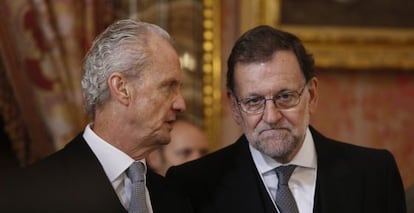Rajoy preparing government and Popular Party for fresh elections
Acting PM hoping to convince Socialists that a minority PP administration is in their interest

With the new year just begun, Spain is facing an unprecedented political situation.
“The most likely scenario right now, with a much higher probability rate than any other, is that we are headed towards a new general election,” said one high-ranking official from the Popular Party (PP), which continues to hold the reins of power following an inconclusive election on December 20.
Acting Prime Minister Mariano Rajoy, who has so far failed to secure enough support to get himself reinstated to a second term in office, has ordered his ministers to keep holding meetings and managing day-to-day affairs. The point is to avoid conveying the sense that the Spanish executive is on hold.
PSOE leader Pedro Sánchez is traveling to Lisbon to find out how the Portuguese Socialists, who were left in a similar situation, managed to reach a governing deal
In the meantime, the conservative party, which won 123 seats on December 20, is working hard to reach a last-minute deal with its traditional rival, the Socialist Party (PSOE), that would allow Rajoy to form a minority government with support from the 90 Socialist deputies. The PP is trying to convince the PSOE that this is preferable to another election at a time when anti-austerity party Podemos is riding a new wave of popularity after securing 69 seats on December 20.
Meanwhile, the Socialists, who were dealt a heavy blow at the election, have since been mired in internal power struggles that are undermining the position of its secretary general, Pedro Sánchez. The latter is traveling to Lisbon on Thursday to meet with Prime Minister Antonio Costa and find out how the Portuguese Socialists, who were left in a similar situation following the recent election there, managed to reach a governing deal with the Communists.
The one party that might support Rajoy, Ciudadanos, only obtained 40 seats, not enough for a majority. And despite talks of an alternative ruling coalition between PSOE, Podemos and other leftist forces, the fact that Podemos defends a Catalan referendum on self-rule seems too much for the PSOE to accept.
All of which means that things remain at square one.
“The process is going to be long, very long even, regardless of Rajoy’s statement on COPE radio that things will perhaps get resolved earlier than some people think,” said one of the prime minister’s top aides.
Since December 20, there has been no progress on the issue of ensuring support from other parties at the investiture vote. Rajoy himself is not in a hurry – that is not his style – but he and his team feel that the key now lies with the PSOE and Pedro Sánchez.
“It’s not that Rajoy and ourselves are paralyzed or blocked or anything – it’s just that there’s nothing more we can do: the prime minister has already repeatedly explained what he feels would be best for Spain; he has begun a round of talks with all the main leaders, and he is still waiting for Sánchez’s reaction,” said an aide.
PP sources said Rajoy does not really believe it is possible to reach a grand coalition in Spain of the type seen elsewhere in Europe, but that he had to try as part of his strategy to apply pressure on the Socialist leader.
To complicate matters further, the northeastern region of Catalonia is almost certainly facing a repeat election of its own after acting premier Artur Mas, of the separatist Junts pel Si coalition, failed to attract enough support from other secessionists to get himself reinstated.
English version by Susana Urra.
Tu suscripción se está usando en otro dispositivo
¿Quieres añadir otro usuario a tu suscripción?
Si continúas leyendo en este dispositivo, no se podrá leer en el otro.
FlechaTu suscripción se está usando en otro dispositivo y solo puedes acceder a EL PAÍS desde un dispositivo a la vez.
Si quieres compartir tu cuenta, cambia tu suscripción a la modalidad Premium, así podrás añadir otro usuario. Cada uno accederá con su propia cuenta de email, lo que os permitirá personalizar vuestra experiencia en EL PAÍS.
¿Tienes una suscripción de empresa? Accede aquí para contratar más cuentas.
En el caso de no saber quién está usando tu cuenta, te recomendamos cambiar tu contraseña aquí.
Si decides continuar compartiendo tu cuenta, este mensaje se mostrará en tu dispositivo y en el de la otra persona que está usando tu cuenta de forma indefinida, afectando a tu experiencia de lectura. Puedes consultar aquí los términos y condiciones de la suscripción digital.








































